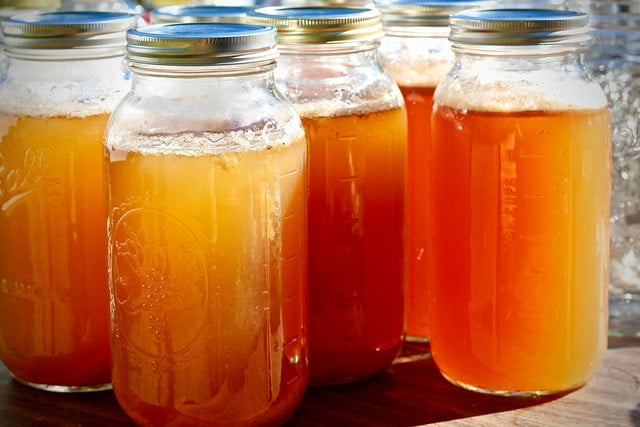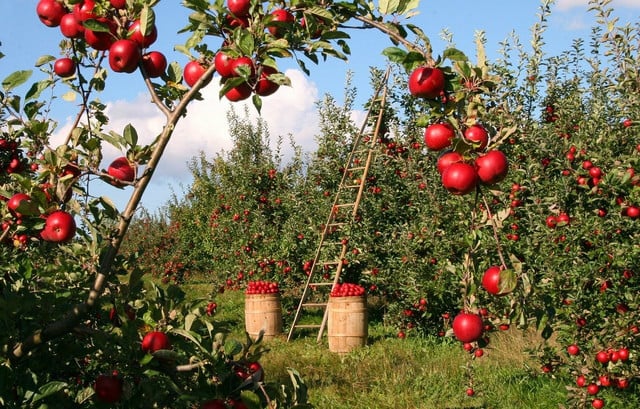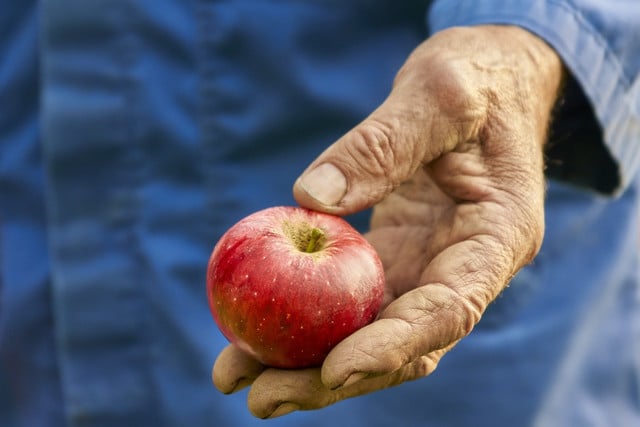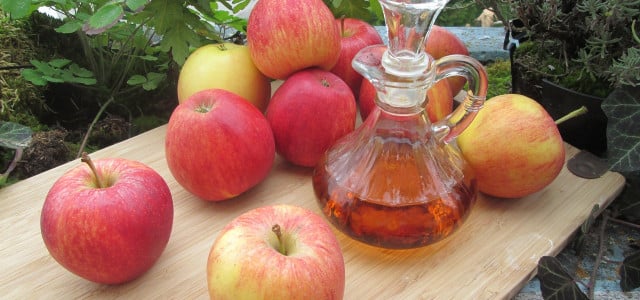Apple cider vinegar, aka ACV, has many benefits, whether around your home or for your health. But is it sustainable? Read on for a deep dive into this pantry staple.
How To Make Apple Cider Vinegar
To make apple cider vinegar, apple juice is fermented twice. Crushed apples are covered in water and the sugars that form ferment the juice into alcohol. The second fermentation occurs when bacteria change the alcohol into acetic acid. This acid is what gives vinegar its sour taste.
It is commonly used in cooking, adding flavor and tang. In baking, the acid reacts with other ingredients, such as baking soda, helping to give extra rise to things like soda bread. In any recipe that calls for sour milk, you can easily make your own buttermilk and vegan buttermilk using apple cider vinegar.
Benefits of Apple Cider Vinegar As a Household Cleaner

(Foto: CC0 / Pixabay / Khaligo)
Apple cider vinegar can be used as a versatile, sustainable and environmentally friendly household cleaner. Because it is made from acetic acid, it is anti-bacterial and can destroy some viruses and tackle a lot of the pathogens that can be found on the surfaces of your kitchen. Why not try these apple cider cleaning solutions?
- All-purpose cleaner: Mix one cup of water and half a cup of ACV. It contains enough acetic acid to fight grease and help with streaky windows. Store it in a glass bottle with a spray attachment, spray and wipe.
- Air freshener: Mixing 1:1 water and apple cider vinegar with a few drops of organic essential oil of your choice makes a natural room deodorizer.
- Apple cider vinegar can be used as a non-toxic way to trap pesky fruit flies. Add a few tablespoons of apple cider vinegar to a jar with a few drops of dishwashing liquid. Cover with something you can poke a few holes in the top (like an old sock or part of a t-shirt) and secure with an elastic band or string.
- You can also use undiluted apple cider vinegar to help unclog a drain. Sprinkle half a cup of baking soda down the drain and follow with one cup of ACV. After five minutes, flush with five cups of freshly boiled water.
- If you want more tips on how to use apple cider vinegar around your house, here’re 15 ways to clean your home using apple cider vinegar.
It should be noted, however, that although acid is anti-bacterial, it doesn’t kill all known bacteria and viruses. Take extra precautions when cleaning surfaces where raw food is prepared. Vinegar-based all-purpose cleaners aren’t recommended for natural stone or marble countertops as the acid could strip away the shine.
Never mix vinegar with chlorine bleach as the combination could create chlorine gas which is an irritant to the eyes, nose and throat.
Health Benefits and Risks of Apple Cider Vinegar



(Foto: CC0 / Pixabay / JennyandtheSummerDay)
Apple cider vinegar is often toted as a miracle ingredient with many health and well-being uses. Although there isn’t much scientific data to prove many of these claims, lots of people around the world feel that ACV benefits them. It is claimed that the ‘mother’, or the cloudy sediment of the apple cider vinegar, is what contains the purported health benefits. This is most likely present in unfiltered, organic vinegar — so always be sure to buy organic apple cider vinegar when possible, like the one by Bragg (available country-wide and on Amazon**).
Potential Benefits of Consuming Apple Cider Vinegar
- Although there isn’t a lot of evidence to show that consuming apple cider vinegar will help you to lose weight, some studies have suggested that acetic acid (one of the main components of apple cider vinegar) helps to reduce body weight and visceral fat.
- It has been said that ACV can make you feel fuller for longer, reducing overeating, which could assist in weight loss.
- There is some evidence that suggests that consuming acetic acid in the form of apple cider vinegar could help with regulating blood sugar levels.
- Many claim that apple cider vinegar can help with a sore throat and a cold — this could have to do with the antibacterial properties of the vinegar. Why not make this fire cider recipe and see for yourself?
- ACV is also used as an ingredient in natural skin remedies, and is said to help with a dry scalp. Next time you want to give yourself a sustainable pedicure, why not try this apple cider vinegar foot soak?
- Using apple cider vinegar for hair care, for example, as an alternative for conditioner, will leave your hair shiny, stronger and is a great way to reduce your single-use plastic consumption.
Potential Risks Associated With Consuming Apple Cider Vinegar
- Apple cider vinegar contains around three to five percent acetic acid, and when consumed undiluted, can cause burns to the mouth and throat. Never consume ‘neat’, meaning undiluted, distilled apple cider vinegar.
- ACV can also damage tooth enamel.
- Consuming large amounts of apple cider vinegar can also damage your stomach. If you start consuming apple cider vinegar, always dilute it with plenty of water and start with a small dose.
- It could also interact with the way some medicines work. Always get advice from your doctor before embarking on a new health regimen.
How Sustainable Is Apple Cider Vinegar?



(Foto: CC0 / Pixabay / lumix2004)
Washington State produces around half of the domestic apples in the U.S., and thirty-two states produce apples commercially. Consuming locally grown produce will likely have a smaller carbon footprint than apples grown overseas. Make use of your local, organic farmers’ markets wherever possible.
Apple farms will usually have different categories for their harvest. Any that aren’t seen as perfect enough for sale as fresh fruit will typically end up as juice or sauce of some kind. ACV is made from crushed apples or juice, so in theory, it is already made from produce that could have ended up as waste.
Homemade apple cider vinegar is an easy way to reduce food waste by using apples that are a bit past their best, or if you or someone you know has an apple tree. Because apple cider vinegar doesn’t really go bad, you can also make it in bulk — acidic food is used as a preservative, after all.
Use of Pesticides and Herbicides in Apple Growing



(Foto: CC0 / Pixabay / wuzefe)
Pesticides and herbicides are used in farming around the globe. Using such substances can damage flora and fauna and impact the food supply within an ecosystem. Not to mention the fact that, even after washing, 70 percent of fresh produce sold in the US was found to have pesticide residue on it. Most conventionally (not organic) grown apples are treated with diphenylamine, an antioxidant chemical that prevents brown and black spots from forming on the apple skin.
Despite the research, it isn’t easy to pinpoint exactly the effect each chemical may have on our health. Still, the Centers of Disease Control and Prevention (CDC) says that many health problems are associated with pesticide exposure.
Conventionally grown apples contain an average of 4,4 pesticide residues. According to the Rodale Institute, one of the main ingredients in the most commonly used herbicides in the world is Glyphosate, a synthetic antibiotic which may damage the useful bacteria in our bodies.
The good news is that organic farming prohibits synthetic pesticides and herbicides — including Glyphosate. One way to make sure you are buying organic produce that follows all guidelines is to look out for the USDA Certified Organic seal. This seal also means that the product will be free from hundreds of harmful additives, preservatives and coloring that are commonly used in non-organic products.
Organic farmers are allowed to use products so long as they are made from naturally occurring materials. One of the few instances that an organic farmer can use a man-made pesticide or herbicide — as the Rodale Institute explains — is if there is no naturally occurring substance that can be used for the same purpose.
For example: Copper sulfate is a synthetic material that can be harmful to the general environment and our health if large quantities are allowed to build up. Its use in organic farming is regulated, and it can only be used after all other options have been explored, exhausted and its necessity is documented. And even then, it can only be used in specific quantities, ways and under strict supervision.
Always choose local and organic produce if you want to make sure that your apples and apple cider vinegar are free from potentially harmful chemicals and synthetic pesticides, and herbicides.
Working Conditions on Apple Farms



(Foto: CC0 / Pixabay / Nordseher)
Apple harvesting is a very labor-intensive job as they are picked by hand. The job involves ladders, heights, exposure and quick changes to the weather. Days often start in the freezing cold of 6 am and go for 10 hours. Dehydration, heat, cold, and wind are all factors that a picker must contend with. Working quickly with dexterity and skill is essential if you are going to meet targets. If you are in good physical shape, you should not pick less than twelve boxes per day — which can equate to six tons.
Many farms operate with seasonal migrant workers. According to the Organic Farmers’ Association (OFA), in California alone, about ninety-five percent of agricultural workers are immigrants, many of whom will be employed through the H-2A program. The H-2A guest workers are legally entitled to things such as fair pay, free housing and good meals, worker’s compensation benefits and medical costs.
However, many workers use costly recruiter programs to find work, which can result in owing large debts, and workers using the H-2A program are not permitted to bring their families with them. Plus, it can be difficult to know if employers adhere to rules and regulations.
Organic and apple farms rely heavily on seasonal workers, many of whom are immigrant workers. The H-2A program is often simply too expensive for many of the organic farms, as the OFA explains. This is because organic farming is already expensive, and the farms tend to be smaller than large-scale industrial ones.
The OFA knows that immigrant workers are a benefit to society and believe that they should have the opportunity to be a part of the local community with their families, which is something that the H-2A program doesn’t provide.
To summarize: Around ninety percent of apples that are eaten, juiced or fermented into apple cider vinegar were picked by immigrants, and one hundred percent were picked by hand. Buying organic and local wherever possible will be more sustainable and environmentally friendly than not. If there is a local farmer’s market near you, make use of the opportunity to speak with the producers — you can ask about the working conditions on the farm. And they might even have some local, organic apple cider vinegar for sale.
Read more:
- 20 Sustainability Podcasts Worth a Listen in 2022
- Preserving Plums: How to Enjoy Them All Year Round
- Vegan Apple Pie Recipe: A Seasonal Favorite
- Put Onion Skins Back to Use: 5 Useful Tricks
Important Information regarding Health-related Topics.
** Links to retailers marked with ** or underlined orange are partially partner links: If you buy here, you actively support Utopia.org, because we will receive a small part of the sales proceeds. More info.Do you like this post?








